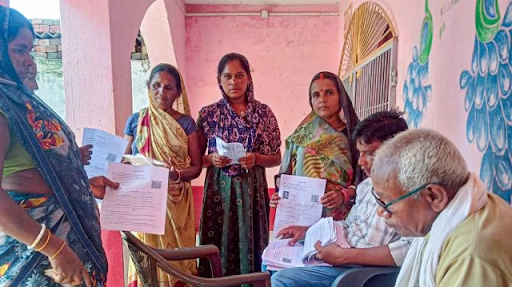



The Supreme Court has ruled that Aadhaar, a voter ID system, is a valid proof of identity but not citizenship, following a petition for voter list revision in Bihar. The ruling upholds the voluntary nature of the Aadhaar-Voter ID link, ensuring privacy and preventing disenfranchisement, demonstrating judicial oversight.

Copyright infringement not intended
Picture Courtesy: Indian Express
The Supreme Court directed the Election Commission of India (ECI) to accept Aadhaar as the 12th document for identity verification during the Special Intensive Revision (SIR) of electoral rolls in Bihar.
The ECI initiated an SIR in Bihar to update the electoral roll, targeting 7.24 crore voters, with 65 lakh names proposed for deletion.
The SIR, announced by the Election Commission under Article 324, requires voters to submit one of 11 specified documents to verify identity and residence.
Petitions filed in Supreme Court, alleging arbitrary deletions and non-acceptance of Aadhaar.
|
Read all about: Special Intensive Revision in Bihar l Indian Citizenship Law |
Aadhaar as the 12th Document: The Court directed the ECI to formally recognize Aadhaar as the 12th document for identity verification in Bihar’s SIR.
Aadhaar Not Proof of Citizenship: The Court restated that under the Aadhaar Act, 2016, Aadhaar is not proof of citizenship but can establish identity and residence.
Safeguards Against Disenfranchisement: The ruling aims to protect genuine voters, particularly those lacking formal documents like passports or birth certificates, by allowing Aadhaar’s use.
Publicity and Compliance: The Court directed the ECI to publicize the order (e.g., on its website) to ensure clarity for voters and officials.
Indian citizenship is governed by the Citizenship Act, 1955, which outlines the modes of acquiring citizenship, termination, and related procedures. The Act, rooted in Articles 5 to 11 of the Constitution.
Modes of Acquiring Indian Citizenship
The Citizenship Act, 1955, specifies five distinct modes through which an individual can acquire Indian citizenship.
By Birth
Any person born in the territory of India on or after January 26, 1950, is a citizen by birth, subject to certain conditions (e.g., exceptions for children of foreign diplomats).
Post-2004 amendments restrict this to individuals with at least one Indian parent and no illegal migrant parent.
By Descent
A person born outside India to Indian citizen parents (or at least one Indian parent after 2004) can acquire citizenship, provided the birth is registered at an Indian consulate within a stipulated period.
By Registration
Eligible individuals, such as those married to Indian citizens, persons of Indian origin residing in India for seven years, or minor children of Indian citizens, can apply for citizenship through registration with the central government.
By Naturalisation
Foreigners who have resided in India for 11 of the last 14 years (with continuous residence in the last 12 months) and meet other criteria (e.g., good character, knowledge of an Indian language) can apply for naturalisation.
By Incorporation of Territory
If a new territory becomes part of India, the central government may declare its residents as Indian citizens (e.g., residents of Sikkim after its merger in 1975).
|
Other Laws Foreigners Act, 1946: Defines a foreigner as a person who is not a citizen of India. It places the burden of proof on the individual to establish citizenship if their nationality is questioned by authorities. Representation of the People Act, 1950 & 1951: Governs electoral processes, including voter registration. Citizenship (Amendment) Act, 2019: Introduces provisions for granting citizenship to persecuted non-Muslim minorities from Pakistan, Bangladesh, and Afghanistan who entered India before December 31, 2014. |
Ambiguity in Documentation
Many individuals, especially in rural or border areas, lack birth certificates or other primary documents due to poor record-keeping or historical administrative gaps.
Burden of Proof
The Foreigners Act places a burden on individuals to prove citizenship, which can be challenging for marginalized groups (e.g.,migrants, or illiterate populations).
Fraudulent Documents
Cases of forged Voter IDs, Aadhaar cards, or passports complicate verification processes, undermining trust in these documents.
Overlap of Electoral and Citizenship Processes
Electoral roll revisions (e.g., Bihar’s initiative) are often mistaken as citizenship verification exercises, causing public confusion and mistrust.
Political and Social Sensitivities
Amendments like the Citizenship (Amendment) Act, 2019, have sparked debates over religion-based citizenship criteria, raising concerns about discrimination and exclusion.
Border states like Assam and West Bengal face unique challenges due to historical migration and porous borders.
Strengthening Documentation Systems
Expand digitization of birth and citizenship records to ensure universal access, especially in rural and border areas.
Integrate databases (e.g., Aadhaar, NPR, voter rolls) with robust safeguards to assist verification without conflating identity with citizenship.
Streamlining Legal Processes
Establish clear, transparent guidelines for proving citizenship, reducing arbitrary application of the Foreigners Act.
Set up dedicated tribunals or fast-track courts to resolve citizenship disputes efficiently.
Public Awareness Campaigns
Educate citizens on the distinction between identity documents (e.g., Aadhaar, Voter ID) and citizenship proof to reduce confusion during electoral revisions.
Leveraging Technology
Use secure, blockchain-based systems for citizenship records to prevent fraud and ensure accessibility.
Develop a unified verification framework that cross-references multiple documents (e.g., birth certificates, school records) without relying solely on one.
Source: Indian Express
|
PRACTICE QUESTION Q. Critically analyze the legal distinction between 'proof of identity' and 'proof of citizenship' as highlighted in the Supreme Court's rulings on Aadhaar. 250 words |
No, as per the Election Laws (Amendment) Act, 2021, the linking of Aadhaar with Voter ID is voluntary.
Aadhaar is a 12-digit unique identity number issued by the Unique Identification Authority of India (UIDAI) to every resident of India.
No, Aadhaar serves as proof of identity and residence, but it is not a document for proving citizenshi




© 2026 iasgyan. All right reserved